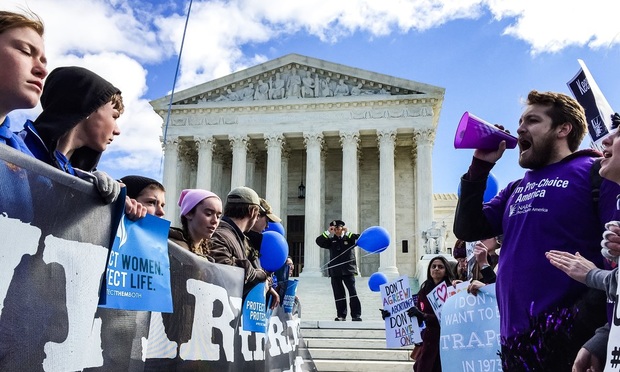Atlanta City Council Takes Stand Against Abortion Ban
“Every woman has the right to choose,” Councilmember Amir Farokhi said. “It's not a decision that the government or, frankly, men, have any business interfering with. No woman should live in fear of prison time or the death penalty for making a decision regarding her health. Likewise, doctors should not fear imprisonment for doing their job.”
May 20, 2019 at 10:40 PM
3 minute read
 Protesters for and against abortion rally outside the U.S. Supreme Court on March 2, 2016. (Photo: Diego M. Radzinschi/ALM)
Protesters for and against abortion rally outside the U.S. Supreme Court on March 2, 2016. (Photo: Diego M. Radzinschi/ALM)
The Atlanta City Council unanimously approved a resolution Monday afternoon opposing the abortion bill that Gov. Brian Kemp signed into law this month.
Councilmember Amir Farokhi, who introduced the legislation, called the 13-0 vote an important statement.
“As the state's largest city, it's important that we join the chorus of Georgians speaking out for a woman's right to choose,” Farokhi said in a news release. “The values represented in that bill are not those held by the majority of Atlantans.”
Farokhi called House Bill 481, which bans abortion after six weeks of pregnancy, and other laws like it an affront to rights set forth in the Constitution and upheld by the U.S. Supreme Court. He said the vote was meant to show solidarity with prosecutors who've said they won't prosecute women for having abortions, despite the new law.
“Every woman has the right to choose,” he said. “It's not a decision that the government or, frankly, men, have any business interfering with. No woman should live in fear of prison time or the death penalty for making a decision regarding her health. Likewise, doctors should not fear imprisonment for doing their job.”
The abortion bans now passed in nine states—including Georgia—prompted the advocates challenging them to issue a national call to action for Tuesday. The groups are tagging their social media statements #StoptheBans.
Nearly 30 similar bans have been introduced around the country, according to NARAL, formerly known as the National Association for the Repeal of Abortion Laws—which has also planned demonstrations around the country for Tuesday.
Georgia's law and other so-called heartbeat bills block abortions at about six weeks and are designed to make almost all abortions illegal. Opponents, calling the bans “forced pregnancy bills,” say they cut off options before most women would know about a pregnancy or confirm it with a clinic.
Alabama followed Georgia and went even further, banning all abortions and allowing no exceptions for rape or incest. Gov. Kay Ivey signed the ban into law immediately. Missouri followed Alabama with an eight-week ban.
The American Civil Liberties Union of Georgia, which is at work on a legal challenge, organized a #StoptheBans demonstration at the state Capitol Tuesday. The Georgia Alliance for Social Justice joined with the ACLU.
“The choice of when and whether to have a family is private and personal. Politicians have no business inserting themselves into decisions made by women and couples in consultation with their own faith, their own family and their own physician,” ACLU of Georgia Executive Director Andrea Young said in a news release Monday. “The appropriate place for our elected officials to act with regard to the health of Georgia's women and families is by expanding Medicaid and making healthcare accessible to all.”
Other groups joining in include: Emily's List, which promotes women for political office, Planned Parenthood Action Fund and Women's March.
This content has been archived. It is available through our partners, LexisNexis® and Bloomberg Law.
To view this content, please continue to their sites.
Not a Lexis Subscriber?
Subscribe Now
Not a Bloomberg Law Subscriber?
Subscribe Now
NOT FOR REPRINT
© 2025 ALM Global, LLC, All Rights Reserved. Request academic re-use from www.copyright.com. All other uses, submit a request to [email protected]. For more information visit Asset & Logo Licensing.
You Might Like
View All
40% Contingency: A New Ruling Just Cost This Plaintiff Team $827K in Legal Fees
6 minute read
'David and Goliath' Dispute Between Software Developers Ends in $24M Settlement

Trending Stories
Who Got The Work
Michael G. Bongiorno, Andrew Scott Dulberg and Elizabeth E. Driscoll from Wilmer Cutler Pickering Hale and Dorr have stepped in to represent Symbotic Inc., an A.I.-enabled technology platform that focuses on increasing supply chain efficiency, and other defendants in a pending shareholder derivative lawsuit. The case, filed Oct. 2 in Massachusetts District Court by the Brown Law Firm on behalf of Stephen Austen, accuses certain officers and directors of misleading investors in regard to Symbotic's potential for margin growth by failing to disclose that the company was not equipped to timely deploy its systems or manage expenses through project delays. The case, assigned to U.S. District Judge Nathaniel M. Gorton, is 1:24-cv-12522, Austen v. Cohen et al.
Who Got The Work
Edmund Polubinski and Marie Killmond of Davis Polk & Wardwell have entered appearances for data platform software development company MongoDB and other defendants in a pending shareholder derivative lawsuit. The action, filed Oct. 7 in New York Southern District Court by the Brown Law Firm, accuses the company's directors and/or officers of falsely expressing confidence in the company’s restructuring of its sales incentive plan and downplaying the severity of decreases in its upfront commitments. The case is 1:24-cv-07594, Roy v. Ittycheria et al.
Who Got The Work
Amy O. Bruchs and Kurt F. Ellison of Michael Best & Friedrich have entered appearances for Epic Systems Corp. in a pending employment discrimination lawsuit. The suit was filed Sept. 7 in Wisconsin Western District Court by Levine Eisberner LLC and Siri & Glimstad on behalf of a project manager who claims that he was wrongfully terminated after applying for a religious exemption to the defendant's COVID-19 vaccine mandate. The case, assigned to U.S. Magistrate Judge Anita Marie Boor, is 3:24-cv-00630, Secker, Nathan v. Epic Systems Corporation.
Who Got The Work
David X. Sullivan, Thomas J. Finn and Gregory A. Hall from McCarter & English have entered appearances for Sunrun Installation Services in a pending civil rights lawsuit. The complaint was filed Sept. 4 in Connecticut District Court by attorney Robert M. Berke on behalf of former employee George Edward Steins, who was arrested and charged with employing an unregistered home improvement salesperson. The complaint alleges that had Sunrun informed the Connecticut Department of Consumer Protection that the plaintiff's employment had ended in 2017 and that he no longer held Sunrun's home improvement contractor license, he would not have been hit with charges, which were dismissed in May 2024. The case, assigned to U.S. District Judge Jeffrey A. Meyer, is 3:24-cv-01423, Steins v. Sunrun, Inc. et al.
Who Got The Work
Greenberg Traurig shareholder Joshua L. Raskin has entered an appearance for boohoo.com UK Ltd. in a pending patent infringement lawsuit. The suit, filed Sept. 3 in Texas Eastern District Court by Rozier Hardt McDonough on behalf of Alto Dynamics, asserts five patents related to an online shopping platform. The case, assigned to U.S. District Judge Rodney Gilstrap, is 2:24-cv-00719, Alto Dynamics, LLC v. boohoo.com UK Limited.
Featured Firms
Law Offices of Gary Martin Hays & Associates, P.C.
(470) 294-1674
Law Offices of Mark E. Salomone
(857) 444-6468
Smith & Hassler
(713) 739-1250







